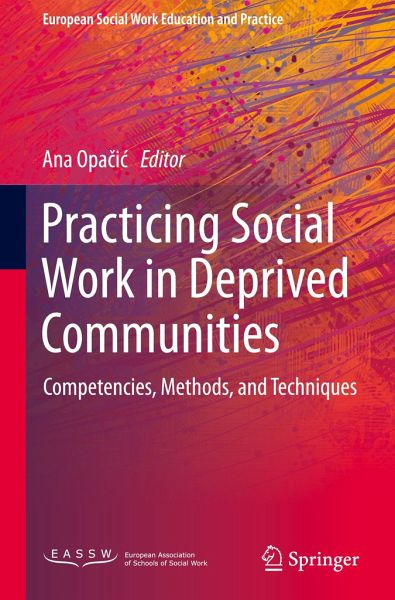
Practicing Social Work in Deprived Communities
Competencies, Methods, and Techniques
Herausgegeben: Opacic, Ana

PAYBACK Punkte
25 °P sammeln!
This contributed volume offers a holistic understanding of social work practice in deprived communities through its thematization of understanding deprived communities globally, the development of competencies for social work practice in and with deprived communities, social work education as a community development tool, and the empowerment of social workers in deprived communities. Inequality as a globally recognized challenge is extensively elaborated within the UN Sustainable Development Goals (SDGs) and the Global Agenda program for social work, making this a timely and important contribu...
This contributed volume offers a holistic understanding of social work practice in deprived communities through its thematization of understanding deprived communities globally, the development of competencies for social work practice in and with deprived communities, social work education as a community development tool, and the empowerment of social workers in deprived communities. Inequality as a globally recognized challenge is extensively elaborated within the UN Sustainable Development Goals (SDGs) and the Global Agenda program for social work, making this a timely and important contribution to the literature.
Deprived communities, used in this book to mean slums, ghettos, favelas, and low-income, remote, underserved, vulnerable, impoverished, underdeveloped, disadvantaged, or less-favoured communities, exist worldwide and are conceptualized under different terms and concepts. For that reason, social work, specifically in deprived areas, is notsufficiently recognized asa specific field of practice within community work. As a result, this volume features contributions that:provide a conceptual clarification of many different terms that are used for describing deprived communities and offer a systematic literature review on community processes and effects on well-being in underdeveloped communities;map different fields of social work involvement in deprived communities with concrete practice examples; and,stress why social work as a profession needs support and how it can be empowered to improve its capacities in deprived communities. With international authorship and perspectives on social work approaches for deprived communities from India, Sub-Saharan Africa, North and Central Europe, and North America, Practicing Social Work in Deprived Communities is an essential resource for social workers, social work educators, and community development practitioners. The text also should be of interest to students of social work, as well as other professionals and researchers working within community development and deprived communities.
Deprived communities, used in this book to mean slums, ghettos, favelas, and low-income, remote, underserved, vulnerable, impoverished, underdeveloped, disadvantaged, or less-favoured communities, exist worldwide and are conceptualized under different terms and concepts. For that reason, social work, specifically in deprived areas, is notsufficiently recognized asa specific field of practice within community work. As a result, this volume features contributions that:provide a conceptual clarification of many different terms that are used for describing deprived communities and offer a systematic literature review on community processes and effects on well-being in underdeveloped communities;map different fields of social work involvement in deprived communities with concrete practice examples; and,stress why social work as a profession needs support and how it can be empowered to improve its capacities in deprived communities. With international authorship and perspectives on social work approaches for deprived communities from India, Sub-Saharan Africa, North and Central Europe, and North America, Practicing Social Work in Deprived Communities is an essential resource for social workers, social work educators, and community development practitioners. The text also should be of interest to students of social work, as well as other professionals and researchers working within community development and deprived communities.












